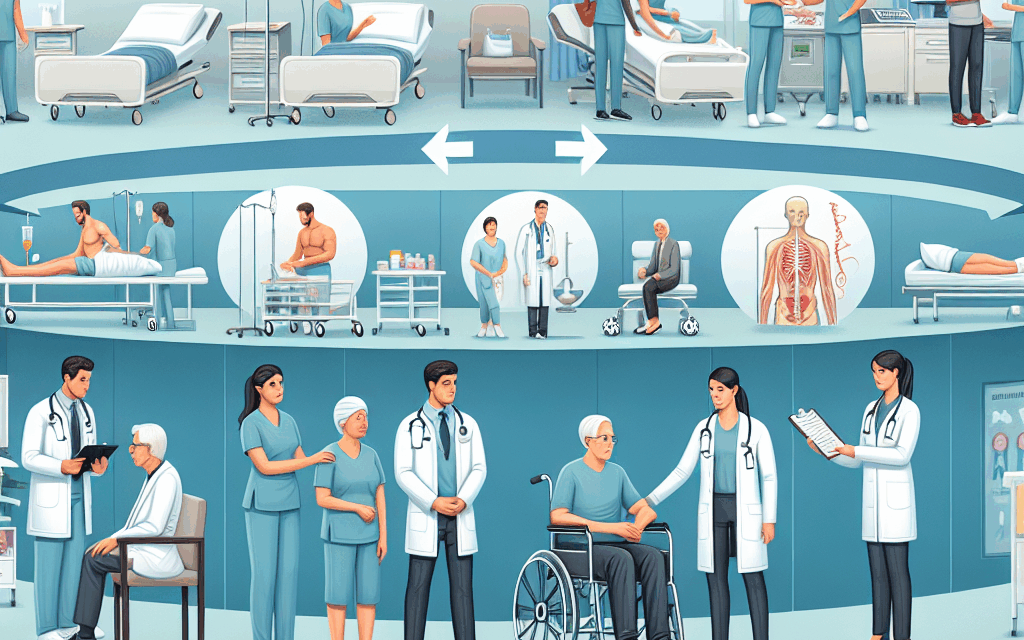Continuum of Care: Exploring Residential to Outpatient Options
The continuum of care is a comprehensive approach to healthcare that ensures patients receive the appropriate level of care at each stage of their treatment journey. This model is particularly significant in mental health and substance use disorder treatment, where the needs of individuals can vary widely. This article will explore the various options available within the continuum of care, from residential treatment facilities to outpatient services, and the importance of a tailored approach to patient care.
Understanding the Continuum of Care
The continuum of care refers to a system of care that provides a range of services to meet the diverse needs of patients. It encompasses various levels of care, including prevention, intervention, treatment, and recovery support. The goal is to ensure that individuals receive the right care at the right time, which can significantly improve outcomes.
In mental health and substance use treatment, the continuum of care is particularly crucial due to the complex nature of these issues. Patients may require different levels of support at different times, and a flexible system allows for adjustments based on individual needs. The continuum typically includes:
- Prevention and early intervention
- Inpatient or residential treatment
- Partial hospitalization programs (PHP)
- Intensive outpatient programs (IOP)
- Outpatient therapy and support groups
Each of these levels plays a vital role in the recovery process, and understanding how they interconnect can help patients and their families navigate the healthcare system more effectively.
Residential Treatment: A Foundation for Recovery
Residential treatment programs provide a structured environment where individuals can focus on their recovery without the distractions and triggers of everyday life. These programs are typically designed for those with severe mental health issues or substance use disorders who require intensive support.
Residential treatment facilities offer a range of services, including:
- 24/7 medical supervision
- Individual and group therapy
- Medication management
- Life skills training
- Family therapy and support
One of the primary benefits of residential treatment is the immersive nature of the program. Patients are removed from their usual environments, which can help them focus solely on their recovery. This setting also allows for a high level of monitoring and support, which is crucial for individuals who may be at risk of relapse.
For example, a study published in the Journal of Substance Abuse Treatment found that individuals who completed a residential treatment program had significantly lower rates of relapse compared to those who did not receive such intensive care. The structured environment, combined with therapeutic interventions, helps individuals develop coping strategies and build a foundation for long-term recovery.
However, residential treatment is not without its challenges. The cost can be prohibitive for some, and the length of stay can vary widely, often ranging from 30 days to several months. Additionally, transitioning from a residential setting back to everyday life can be difficult, making aftercare planning essential.
Partial Hospitalization Programs (PHP): A Step Down from Residential Care
Partial hospitalization programs (PHP) serve as a bridge between residential treatment and outpatient care. These programs provide intensive treatment during the day while allowing patients to return home in the evenings. PHPs are ideal for individuals who have completed residential treatment but still require a high level of support.
Key features of PHPs include:
- Structured daily schedule
- Individual and group therapy sessions
- Medication management
- Family involvement
- Skills training and relapse prevention strategies
PHPs typically run five to seven days a week and can last anywhere from a few weeks to several months, depending on the individual’s needs. This level of care allows patients to practice their coping skills in a real-world environment while still receiving the support they need.
Research has shown that PHPs can be highly effective in reducing symptoms and improving overall functioning. A study published in the American Journal of Psychiatry found that patients who participated in PHPs experienced significant improvements in their mental health symptoms and were less likely to require hospitalization compared to those who received outpatient care alone.
One of the advantages of PHPs is the flexibility they offer. Patients can continue to engage with their families and communities while receiving intensive treatment. This can help ease the transition back to everyday life and reduce the risk of relapse.
Intensive Outpatient Programs (IOP): Flexibility and Support
Intensive outpatient programs (IOP) provide a lower level of care than PHPs but still offer significant support for individuals in recovery. IOPs are designed for those who have completed residential treatment or PHPs but need ongoing support to maintain their progress.
IOPs typically include:
- Group therapy sessions
- Individual counseling
- Family therapy
- Relapse prevention education
- Support for co-occurring disorders
IOPs usually meet several times a week for a few hours each session, allowing patients to maintain their daily responsibilities, such as work or school. This flexibility can be particularly beneficial for individuals who are transitioning back into their regular lives but still require support.
Research indicates that IOPs can be effective in reducing symptoms and preventing relapse. A study published in the Journal of Substance Abuse Treatment found that individuals who participated in IOPs reported significant improvements in their mental health and substance use behaviors.
Moreover, IOPs often emphasize the importance of community support. Many programs incorporate peer support groups, which can provide additional encouragement and accountability. This sense of community can be invaluable for individuals in recovery, helping them feel less isolated and more connected to others who understand their struggles.
Outpatient Therapy: Continuing Care for Long-Term Recovery
Outpatient therapy is the least intensive level of care within the continuum and is designed for individuals who have achieved a certain level of stability in their recovery. This option is suitable for those who may not require the structured environment of residential or intensive programs but still benefit from ongoing support.
Outpatient therapy typically includes:
- Individual counseling sessions
- Group therapy
- Support groups (e.g., Alcoholics Anonymous, Narcotics Anonymous)
- Relapse prevention strategies
- Skill-building workshops
One of the primary advantages of outpatient therapy is its accessibility. Patients can attend sessions while continuing to work, attend school, or fulfill family responsibilities. This flexibility can make it easier for individuals to integrate their recovery into their daily lives.
Research has shown that outpatient therapy can be effective in promoting long-term recovery. A study published in the Journal of Substance Abuse Treatment found that individuals who engaged in outpatient therapy reported lower rates of relapse and improved overall functioning compared to those who did not receive ongoing support.
However, outpatient therapy does require a certain level of self-motivation and commitment. Individuals must be willing to actively participate in their recovery and seek help when needed. For some, this can be a challenge, particularly if they are facing external stressors or triggers.
The Importance of Aftercare and Support Services
Regardless of the level of care, aftercare and support services play a crucial role in the recovery process. Aftercare refers to the ongoing support and resources available to individuals after they complete a treatment program. This can include:
- Continued therapy sessions
- Support groups
- Relapse prevention planning
- Job training and educational resources
- Family support services
Aftercare is essential for several reasons. First, it helps individuals maintain the progress they made during treatment. Transitioning back to everyday life can be challenging, and having a support system in place can make a significant difference. Additionally, aftercare can help individuals identify and address potential triggers or stressors that may arise in their daily lives.
Research has shown that individuals who engage in aftercare services are more likely to maintain their recovery and avoid relapse. A study published in the Journal of Substance Abuse Treatment found that individuals who participated in aftercare programs reported higher levels of satisfaction with their recovery and lower rates of substance use compared to those who did not engage in aftercare.
Moreover, aftercare can provide individuals with valuable resources and tools to navigate challenges they may face in their recovery journey. This can include job training programs, educational resources, and family support services, all of which can contribute to a more stable and fulfilling life post-treatment.
Conclusion: Navigating the Continuum of Care
The continuum of care is a vital framework for understanding the various levels of support available to individuals in recovery from mental health and substance use disorders. From residential treatment to outpatient therapy, each level plays a crucial role in helping individuals achieve and maintain their recovery.
As we have explored, residential treatment provides a solid foundation for recovery, while PHPs and IOPs offer transitional support as individuals move back into their daily lives. Outpatient therapy serves as a critical component for long-term recovery, allowing individuals to continue their healing journey while managing their responsibilities.
Ultimately, the key to successful recovery lies in a tailored approach that considers the unique needs of each individual. By understanding the continuum of care and the options available, patients and their families can make informed decisions about their treatment journey. With the right support and resources, individuals can navigate the challenges of recovery and build a fulfilling life free from the constraints of mental health and substance use disorders.





